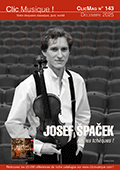 Vox in Bestia répond à Vox in Femina, premier concert pour voix non accompagnée créé en 2010 par Laura Catrani – au Conservatoire de Milan, elle fait de la Sequenza III de Luciano Berio sa pièce de résistance – et explore le bestiaire fantastique de la Divine Comédie, ce témoin littéraire de la civilisation médiévale, au travers des contributions de trois compositeurs compatriotes, écrites sur mesure pour la voix de la soprano italienne. Dans Inferno, Fabrizio De Rossi Re (1960-) évoque le grotesque, l’irrévérencieux de ces bêtes, réelles ou horrifiques, au travers d’une déambulation, d’Offfenbach aux standards de jazz, en passant par la pop ou la chanson italienne de la fin du 19ème siècle ; dans Purgatory, Matteo Franceschini (1979-) s’attarde sur ce qui distingue les animaux du purgatoire de Dante, sur les plans réaliste et symbolique – et focalise sur le sens pénitentiel commun ; dans Paradiso, Alessandro Solbiati (1956-) traduit son ressenti face au bestiaire du paradis en excluant (quasiment) les mots, afin de s’écarter de l’évidence et de rester concis. Le tout est relié par le texte de Tiziano Scarpa, commentaire littéraire de l’œuvre dantesque, doucement dit par Catrani sur disque – sur scène, où s’ajoutent luth et courtes vidéos animées, il est lu par l’auteur. (Bernard Vincken)  My first concert for the unaccompanied voice was Vox in Femina (2010), in which I brought together some of the great twentieth-century and contemporary composers. Vox in Bestia is a natural progression of that work. The idea came about in 2020, in the midst of the pandemic. I was thinking about a new project for a solo voice when I came across the universe of fantastical animals and medieval bestiaries. I was also thinking about Dante’s upcoming anniversary. And that is when the idea came to me: I could create a Dante-esque bestiary, a sort of exploration of the real and fantastical animals found in The Divine Comedy, observed and perceived through the prism of my voice. I brought together the composers Fabrizio De Rossi Re, Matteo Franceschini and Alessandro Solbiati, asking each of them to compose five short pieces for a solo voice inspired by Dante’s tercets that talk about animals. They were to compose in their own style, based on their individual personalities and sensibilities.A narrative line by a distinguished voice of contemporary Italian literature would be interwoven alongside them. I felt that Tiziano Scarpa was the perfect writer – he is imaginative and at the same time rooted and concrete – so I asked him to write a sort of literary commentary to Dante’s verses. (Laura Catrani)
 |
